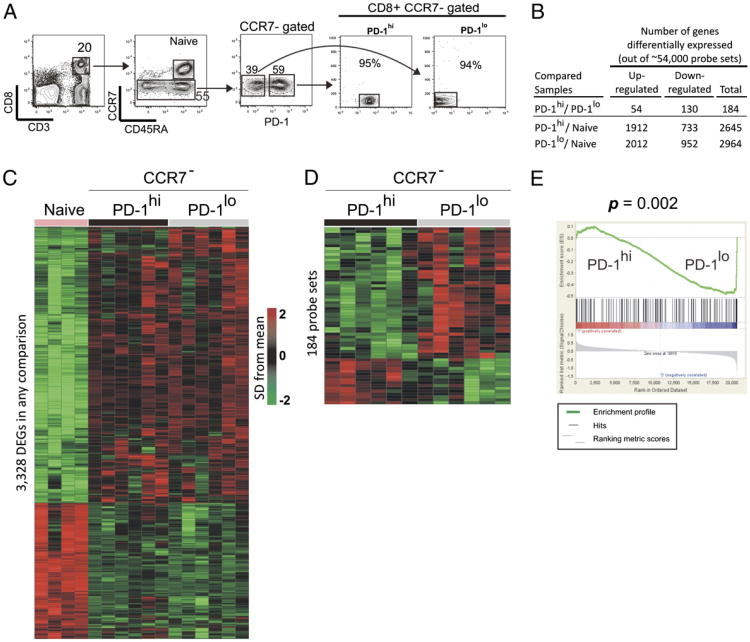Phenotype, function, and gene expression profiles of programmed death-1(hi) CD8 T cells in healthy human adults.
T cell dysfunction is an important feature of many chronic viral infections. In particular, it was shown that programmed death-1 (PD-1) regulates T cell dysfunction during chronic lymphocytic choriomeningitis virus infection in mice, and PD-1(hi) cells exhibit an intense exhausted gene signature. These findings were extended to human chronic infections such as HIV, hepatitis C virus, and hepatitis B virus. However, it is not known if PD-1(hi) cells of healthy humans have the traits of exhausted cells. In this study, we provide a comprehensive description of phenotype, function, and gene expression profiles of PD-1(hi) versus PD-1(lo) CD8 T cells in the peripheral blood of healthy human adults as follows: 1) the percentage of naive and memory CD8 T cells varied widely in the peripheral blood cells of healthy humans, and PD-1 was expressed by the memory CD8 T cells; 2) PD-1(hi) CD8 T cells in healthy humans did not significantly correlate with the PD-1(hi) exhausted gene signature of HIV-specific human CD8 T cells or chronic lymphocytic choriomeningitis virus-specific CD8 T cells from mice; 3) PD-1 expression did not directly affect the ability of CD8 T cells to secrete cytokines in healthy adults; 4) PD-1 was expressed by the effector memory compared with terminally differentiated effector CD8 T cells; and 5) finally, an interesting inverse relationship between CD45RA and PD-1 expression was observed. In conclusion, our study shows that most PD-1(hi) CD8 T cells in healthy adult humans are effector memory cells rather than exhausted cells.
Authors
Jaikumar Duraiswamy; Chris C Ibegbu; David Masopust; Joseph D Miller; Koichi Araki; Gregory H Doho; Pramila Tata; Satish Gupta; Michael J Zilliox; Helder I Nakaya; Bali Pulendran; W Nicholas Haining; Gordon J Freeman; Rafi Ahmed
External link
Publication Year
Publication Journal
Associeted Project
Microbiology or Immunology
Lista de serviços
-
RASL11A, member of a novel small monomeric GTPase gene family, is down-regulated in prostate tumors.RASL11A, member of a novel small monomeric GTPase gene family, is down-regulated in prostate tumors.
-
Splice variants of TLE family genes and up-regulation of a TLE3 isoform in prostate tumors.Splice variants of TLE family genes and up-regulation of a TLE3 isoform in prostate tumors.
-
Concepts on Microarray Design for Genome and Transcriptome AnalysesConcepts on Microarray Design for Genome and Transcriptome Analyses
-
The iron stimulon of Xylella fastidiosa includes genes for type IV pilus and colicin V-like bacteriocins.The iron stimulon of Xylella fastidiosa includes genes for type IV pilus and colicin V-like bacteriocins.
-
Origins of the Xylella fastidiosa prophage-like regions and their impact in genome differentiation.Origins of the Xylella fastidiosa prophage-like regions and their impact in genome differentiation.
-
The role of prophage in plant-pathogenic bacteria.The role of prophage in plant-pathogenic bacteria.
-
Genetic control of immune response and susceptibility to infectious diseases.Genetic control of immune response and susceptibility to infectious diseases.
-
Building capacity for advances in tuberculosis research; proceedings of the third RePORT international meeting.Building capacity for advances in tuberculosis research; proceedings of the third RePORT international meeting.
-
São Paulo School of Advanced Sciences on Vaccines: an overview.São Paulo School of Advanced Sciences on Vaccines: an overview.
-
A reasonable request for true data sharing.A reasonable request for true data sharing.

